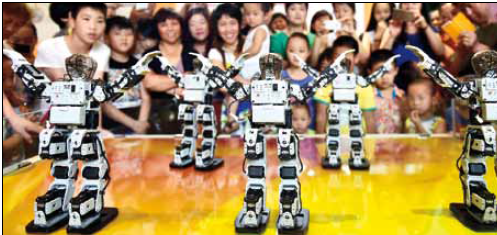|
 China has become the largest consumer of robots in the world
China has become the largest consumer of robots in the world
First it was factory workers, then waiters. Now it seems journalists are next in line to be replaced by industrial robots.
In August, China's largest Internet and gaming company Tencent produced a business report - written by a robot - adding to fears among local journalists that their jobs are in danger.
The newly-developed robot journalist, aptly named "Dreamwriter," had its first news story in Chinese published on the company's QQ.com website. The 916-word, mistake-free article, August CPI a New High in the Past 12 Months, took only one minute to produce and has sent shockwaves through journalist circles. The majority of Chinese media said the article was well-written and coherent, causing local reporters to fret about the possibility of a robot replacing them in the near future.
While journalists may be wary of such innovation and technology, Tencent said they hope their robotic news writers, which can produce more than 100 news segments every day, would free journalists to do more challenging and intellectually demanding work.
Programed to produce
To be perfectly honest, these are not robots exactly, rather, algorithms that are set to templates. They have the ability to scan through large amounts of data in only a few seconds and can detect trends, records and insights. They then place them in context and chronological order. The algorithms are also programed to form a natural language structure and format the data.
"Generating news stories in plain language following a certain template is not difficult for computers," Wu Dekai, a former associate professor at the Hong Kong University of Science and Technology, said back in 2012. "There is no reason why we can't do it in Chinese as well."
Wu added that they can build hundreds or even thousands of templates for different types of stories - from sudden share movements to merger-and-acquisition deals.
However, there are still many skeptics who are unsure about how far this can go. A few experts claim it will take decades before robot writers can enhance their ability to produce more creativity, such as investigative or human interest stories.
Robots taking jobs from humans has become a big talking point worldwide over the past few years. Today, China has approximately 30 industrial robots per 10,000 manufacturing workers, against the global average of 62, according to the HSBC. In comparison with more advanced economies, it is 10 times less than Germany's and 14 times lower than in South Korea.
Policy push
China plans to update its manufacturing chain to produce more sophisticated and top-of-the-range goods. The government is currently pushing a Made in China 2025 program aimed at moving the country away from labor-intensive work into more advanced sectors like robotics.
"China is going to have to become more successful at robotics because its labor costs are rising so fast," said David Autor, a professor of labor economics at the Massachusetts Institute of Technology. "It's either you increase productivity through automation or the work is done in another country like Viet Nam, Cambodia or Brazil."
"Some people ask why developed countries need to develop robots when they barely have any strenuous manual work for the robots to do. The answer is that these countries and regions are trying to solve a different problem from China," said Song Xiaogang, Executive Director of the China Robot Industry Alliance.
As the robot industry in China, and indeed the world, hurtles on, it remains to be seen if the jobs of journalists, waiters, factory workers and who knows which other professions, become a thing of the past. Kris Hammond, co-founder of American technology company Narrative Science, may have predicted correctly when he said more than 90 percent of the news in the United States would be written by computer programs by 2027.
Perhaps it will not be surprising if it happens in China sooner. |